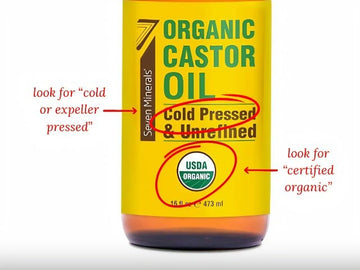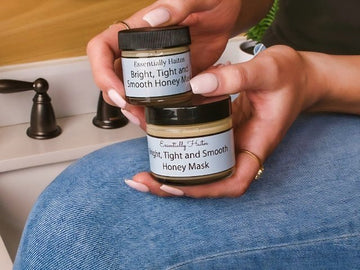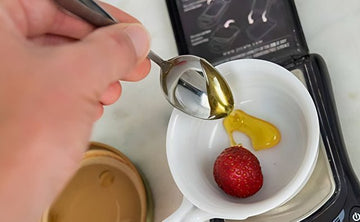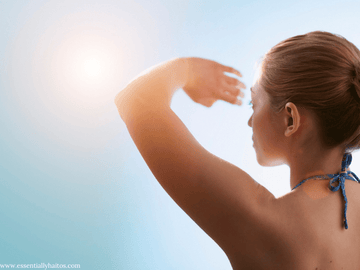It can be a challenge to get (and keep) clear skin. And, the methods vary depending on your skin type. Unfortunately, if you’re struggling with acne or blemishes, you can have skin that is dry, oily, or a combination of the two!
Read on for tips based on general skin type – and general tips at the end.
If you have oily skin…
Use the double-cleansing method
This is absolutely my TOP TIP FOR EVERYBODY – but especially if you have oily skin (or really dirty / sweat covered skin – think working in a dirty environment or a great workout)
Double-cleansing means you first cleanse with a wash-off oil cleanser (DHC has the best one on the market IMHO). Apply the cleanser to dry skin, massage all over your face and rinse off with warm water. Follow with a GENTLE cleanser of your choice. (The science behind oil cleansing is that the oil cleanser attracts the oil on your face and washes it all down the drain when you rinse it off). I cannot recommend this enough – it will truly, truly change how you cleanse your skin.
Wash your hair daily
If you have oily skin, you may also have an oily scalp. This excess oil can move to the face and encourage breakouts (think about breakouts you get along your hairline). Washing your hair each day may help control oil and reduce your breakouts.
Use a toner
If you have oily skin and are prone to acne, you may benefit from using a gentle toner to help unclog your pores. Products containing ingredients such as salicylic acid or glycolic acid may help balance the skin’s pH and keep the pores clear. (Essentially Haitos is launching a cleanser, toner, and moisturizer geared toward oily, acne-prone skin. Look for them coming out in March 2021.)
Always wear sunscreen
Oily skin may also be more reactive to sunlight. Wearing sunscreen during any exposure to sunlight may help reduce this reaction. However, it is important to find sunscreens without oil or other ingredients that will contribute to more clogged pores. Powder-based or zinc oxide-based sunscreens are a great option.
If you have combination skin…
Use the double-cleansing method
I’m not going to explain double-cleansing again (or how GAME CHANGING it is) – read the Cleansing section under Oily Skin.
Blotting papers are your best friend (or a good friend at least)
Use blotting papers on your oily spots to help temporarily balance combination skin and make it easier to manage. They may also stop sebum overproduction from leading to acne breakouts in your oily areas (typically forehead, nose and chin).
Use a toner only on oily areas
For the same reasons stated in the Oily Skin section, use a toner with salicylic acid or glycolic acid – it may help balance the skin’s pH and keep your pores clear.
Again, always wear sunscreen
But unfortunately, you may need to use two different ones depending how “combination” your combination skin is – one for the oily areas (see recommendations above) and another for your dry areas. However, sunscreen texture and absorbability has improved immensely over the past few year, so you may be able to find one to meet your needs.
If you have dry skin…
Find a gentle moisturizer
Moisture is essential for your dry skin, but it is important to find a source of moisture that does not clog your pores (i.e. heavy and film-forming). You may find that your skin responds well to natural oils, such as argan oil, olive oil, or coconut oil. Check out Essentially Haitos’ Ten+ Nourishing Oil – it absorbs like a dream, does not leave your face “oily”, improves texture – and if it’s not enough on your stubborn dry patches, throw a cream moisturizer on top. Either way, your skin will benefit from all nutrients it contains.
Use gentle washes (ahem – double cleansing method)
Once again, I swear by oil-cleansing. If you have dry skin, an oil cleanser may be all you need. It dissolves dirt, makeup, and oil – all without stripping moisture from your skin. You can still follow with a very gentle, creamy cleanser if you’d like.
General skin care tips…
Avoid popping pimples (as tempting as it may be)
A pimple indicates trapped oil, sebum, and bacteria. It is also a sign that the body’s natural healing mechanism is working (so a pimple is a good thing???)
Popping pimples actually disrupts this healing process. Additionally, the released liquids expose the surrounding skin to similar bacteria, increasing the risk of additional pimples forming. The exposed pimple may also lead to permanent scarring.
Wash twice daily, and again after sweating
The American Academy of Dermatology recommends that you wash twice daily and then again after sweating. (Leaving sweat on the skin and allowing it to dry can make acne worse.)
Avoid touching your face
Touching your face with your hands can deposit dirt, oils, and bacteria onto the skin and lead to breakouts.
Moisturize
All skin types benefit from moisturizing after washing. Keeping your skin moisturized and hydrated helps balance sebum production and therefore the potential for clogged pores.
This may sound crazy, but using a high quality facial oil as a moisturizer may benefit troubled skin more than traditional moisturizers. Pure oils are easily absorbed and contain a higher concentration of skin-healthy nutrients (and they really do not leave your skin oily).
Always wear sunscreen
The sun’s ultraviolet (UV) rays damage the skin. Wearing sunscreen whenever outdoors can help protect the skin from these harmful rays.
Use gentle products
If you need extra care for your skin (i.e. sensitive, easily irritated skin), use gentle products, which are less likely to stress the skin. Products that commonly irritate sensitive skin include:
- alcohol-based products
- toners
- exfoliants
- astringents
Gentle, hypoallergenic versions of these products do exist. However, it is still important to test a small area of your skin for reactions before applying any product to your whole face.
Avoid hot water
Showering, bathing, or washing your hands and face with very hot water can dry out or damage your skin. If you notice dry skin after bathing or showering, try using lukewarm water instead
Use gentle cleansing devices
Exfoliation washes away dead skin cells, which helps to clear your pores. Exfoliation also allows your skin care products to work better. But…some devices can be too abrasive and may actually harm your skin. Rough sponges and washcloths, or loofahs may be too rough for your skin, causing damage and irritation.
Some delicate options exist, such as soft cleansing brushes or wireless silicone facial brushes. Essentially Haitos carries highly rated silicone facial brushes here – they can make a huge difference in your cleansing routine.
Stay hydrated
All cells in your body need water. The skin cells are closest to the environment and, therefore, are more at risk of losing their moisture to the elements. Drinking water throughout the day may help keep the skin cells healthy.
Eat a healthy diet
Eating a healthy diet rich in nutrients is important for your body, and of course, your skin. Eating a diet rich in various plant foods and lean protein sources provides the nutrients that your skin needs to stay healthy.
If you’re serious about trying to keep your skin clear, you may also want to cut out specific troublesome foods, such as dairy milk. A review in Clinical Nutrition found a positive relationship between milk and acne. Researchers believe that this link is due to the growth compounds and hormones most milk contains.
However, you may have different trigger foods that make your symptoms worse. You know yourself better than anyone – so trust yourself.
Use natural makeup products
Sometimes, makeup products can aggravate breakouts. Switching to natural makeup products or those designed to let the pores breathe may help reduce breakouts from makeup.
It is also important to remove all makeup each night and clean any makeup brushes or tools regularly. (Did I hear somebody say that the oil cleaners remove all traces of dirt, oil and makeup? Yes, yes they do!)
Lifestyle changes
Although the evidence is largely anecdotal, some lifestyle changes may also help keep your skin balanced. Lifestyle changes to consider include:
- getting a full night’s rest each night
- avoiding smoking
- reducing or eliminating excess sugar
- avoiding fried foods
Reduce stress
It is also important to minimize stress whenever possible. The authors of a 2017 article noted that acne vulgaris is one of the most common inflammatory skin disorders.
They also highlight the link between stress and acne, stating that stress can increase inflammatory compounds in the body. Strong feelings of anger or emotional stress may lead to an acne breakout or make symptoms worse. (Honestly, I didn’t need a study to tell me that, but it’s nice when researchers confirm what I – and you – already know.)
Due to this, it is important to find ways of reducing stress to help control acne. Stress management techniques include:
- exercising regularly
- getting massages or acupuncture
- engaging in calming practices, such as meditation or breathing exercises
- doing movement activities, including yoga and tai chi
Stress-reducing activities will also vary from person to person. You may enjoy going for a walk in the woods while your best friend might prefer writing in a journal, for example.
Summary
You can try a variety of techniques for attaining clear skin at home, and the best methods depend on your skin type (and are highlighted in this article).
General lifestyle changes, such as reducing stress, staying hydrated, and eating a healthy diet, can also be effective for many people.







